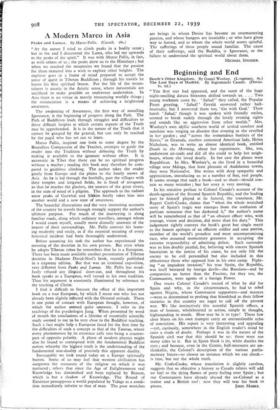Beginning and End
"THE first star had appeared, and the scent of the huge night-smelling datura blossoms drifted towards us. . . . Two young workmen came by. Salud! ' they called, the Popular Front greeting. Salud! ' Gerald answered rather half- heartedly, but I answered them too, Go with God.' Their harsh Salud,' though it was spoken with friendly smiles, seemed to break rudely through the lovely evening sights and sounds like an aggression from other worlds." Mrs. Woolsey's own idyllic southern world of settled comfort and sunshine was verging on disaster that evening as she revelled in her garden ; and " across the tremendous barriers of the Sierra," in Granada, another contented American lady, Helen Nicholson, was to write an almost identical book, entitled Death in the Morning, about her experiences. She, too, underwent air-raids and did all she could to help her neigh- bours, whom she loved dearly. In her case the planes were Republican. In Mrs. Woolsey's, as she lived in a beautiful village near Malaga, that least pleasant of Andalusian towns, they were Nationalist. She writes with deep sympathy and appreciation, introducing us to a number of fine, real people. It seems strange that such a book—and so short—should con- tain so many mistakes ; but her story is very moving.
In his sensitive preface to Colonel Casado's account of the death-agonies of the Second Spanish Republic, and the leading part he himself played at its funeral, the translator, Mr. Rupert Croft-Cooke, claims that " when the whole wretched story of Spain's tragic war emerges from the confusion of partisan nonsense that has darkened it," the author's name will be remembered as that of " an obscure officer who, with courage, vision and decision, did more than his duty." This judgement rightly conveys the book's great but single merit as the honest apologia of an efficient soldier and sane patriot, member of the world's proudest and most uncompromising race, who assumed momentary greatness in accepting the extreme responsibility of admitting defeat. Such surrender was to him doubly painful, for, believing with sincere Spanish fanaticism in the justice of his cause, he not only felt the enemy to be evil personified but also included in this abhorrence those who opposed him in his own camp. Fight- ing " an impudent invasion," his true Spain, the Republic, was itself betrayed by foreign devils—the Russians—and by compatriots no better than the Fascists, for they too, the Communists, were agents of a foreign Power.
One trusts Colonel Casado's record of what he did for Spain and why, in the circumstances, he had to rebel against Negrin, whose Communist supporters—and masters —were as determined to prolong that bloodshed as their fellow sectaries in this country are eager to call off the present war. We like instinctively this scornful Spanish officer, a man of honour, wholehearted in action, simple in thought, highsounding in-words. How true he is to type! Those few clear blasts on his own trumpet carry an untranslatable echo of conviction. His report is very interesting and appealing —yet, curiously, somewhere in the English reader's mind he casts a shade of doubt. Perhaps it was in the nature of the Spanish civil war that this should be so: there were too many sides to it. But in Spain black is jet, white dazzles the eyes ; and because, even in the Centre, half-measures are un- thinkable, the Colonel's description of the various parlia- mentary forces—to choose an instance which we can check— is true, but not the whole truth.
Mr. Croft-Cooke, whose translation is slightly careless, suggests that so objective a history as Casado relates will add no fuel to the dying flames of party feeling over Spain ; but our Communists have already abused the ex-Colonel as a traitor and a British too!: now they will tear his book to




































 Previous page
Previous page